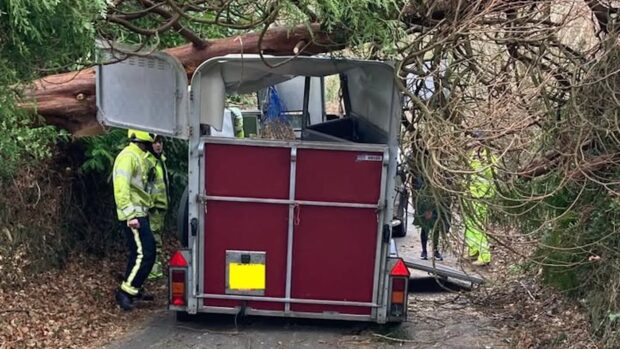Police are warning drivers on Dartmoor to slow down after an increasing number of fatal accidents involving ponies
Drivers using the roads across Dartmoor are being asked to slow down and drive more carefully following a number of “hit and run”incidents, where drivers have left ponies for dead after colliding with them.
The police are reminding drivers that any accident involving livestock, which includes horses and ponies, must be reported or the driver could risk ending up in prison.
The 1988 Road Traffic Act states it is the driver’s responsibility to inform the police as soon as possible (which must be within 24 hours), following any accident with livestock.
A driver who fails to comply with the law could find themselves in jail for up to six months, and be fined up to £5,000. The offender will also receive between five and 10 penalty points on their drivers’ licence and possible disqualification.
“We want drivers to report accidents as soon as is practicable,” says PC Duncan Russell, road safety officer for Plymouth. “This will enable us to send someone out to check the condition of the animal and organise veterinary care or to remove the carcass as necessary.
“A dead pony, sheep or cow lying on the road is an accident waiting to happen, while any injured animal needs to receive prompt veterinary attention. This is impossible unless accidents are reported.”
Speeding drivers
A 40mph speed limit was introduced on Dartmoor’s roads in an attempt to improve safety for the roaming animals and non-vehicular road users, such as horse riders, walkers and cyclists. However, speeding drivers are believed to be responsible for many of the animal deaths.
“Although the vast majority of Dartmoor’s road users drive sensibly, there is a small minority of regular users who do not take into consideration that there may be an animal around the next bend,” explains Mike Nendick, spokesperson for the Dartmoor National Park Authority.
This is born out by the results of the latest speed check carried out on the road between Princetown and Yelverton. During three hours 49 drivers were caught breaking the speed limit.
According to the National Park Authority, the problem exists all year round, with drivers who use the roads regularly more likely to speed than the hundreds of tourists who flock to the region in the summer months.
“Because the majority of tourists don’t know the roads they tend to drive slower than drivers who use the roads across Dartmoor on a daily basis to get to work,” continues Mike.
“Unfortunately some drivers make the mistake of thinking that a road which has a fence or dry stone wall running alongside it won’t have any livestock or non-vehicular road users on it, when this simply isn’t the case.”
The police are supporting the National Park’s campaign for visitors and locals alike to take “Moor Care” when using Dartmoor’s roads.
“We want drivers to slow down and be more aware of the potential for livestock to be on Dartmoor’s roads,” says PC Russell. “The animals don’t have any road sense so it the drivers’ responsibility to drive cautiously to prevent injury to the animals and themselves.”
For more information on the “Moor Care” campaign www.dartmoor-npa.gov.uk
Read more dartmoor/exmoor issues:





